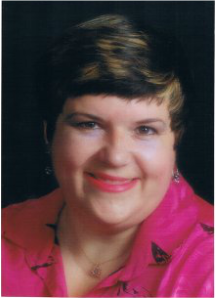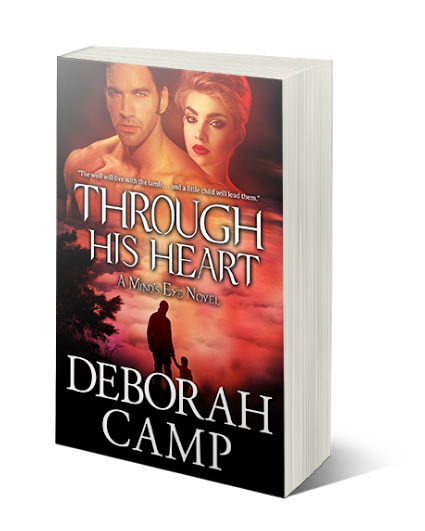I’m Deborah Camp, author of more than 45 published novels, both contemporary and historical. My first book was published in 1979 by Simon & Shuster. I live in Oklahoma with my significant other and a bunch of sweet dogs.
I’m a charter member of the Romance Writers of America and I’m a member of The Authors Guild, Oklahoma Writers Federation, Inc, and the Tulsa Night Writers.
When I’m not writing or reading, I’m usually volunteering with the Animal Rescue Foundation in Tulsa, rescuing pets from kill shelters and finding great new homes for them.
I’ve made my living as a writer my whole adult life, so I’m very blessed.
Tell us about your latest book.
My most current book is the third novel in my Mind’s Eye series, which features psychic detectives Trudy Tucker and Levi Wolfe. Each book is stand-alone as far as the mystery goes, but the relationship between Trudy and Levi continues to evolve throughout the series. THROUGH HIS HEART deals with the kidnapping of a child – a step-sister Levi has never met – and Trudy’s insistence in helping find the girl, even though it means dealing with Levi’s father, John Comfort. The Rev. Comfort is an evangelical TV minister who rejected Levi when he was a child, which threw Levi into a world of mental and physical torture. He hates his father and his father has no use for him, so being in the same town together is explosive for both of them.
Caught in this tangled web of deceit and hatred, Trudy and Levi try to find the girl using their psychic abilities while Levi tries not to spin out of control and into the emotionally charged chaos he’s tried so hard to avoid.
Levi and Trudy approach their work from different angles because Levi can commune with the deceased or victims of crimes and Trudy can get into the criminal’s mind and see what he sees, hear what he hears, etc. They make a formidable team.
What do you have coming out in the future?
My work-in-process is a western set in Texas, two years after the end of the Civil War. It’s a love story, dealing primarily with the aftermath of life after the war and the festering hatred, animosity, and fear most people struggled with at that time. It’s a story of redemption and how men and women deal differently with the trauma of war. Its scheduled release is in early 2016.
After that, I’ll write #4 in the Mind’s Eye series.
The Mind’s Eye series is different from most because it has something for everyone – romance, hot sex, suspense, danger, intrigue, and paranormal. I think I’m successful in weaving all those elements into each book. From the reviews I’ve received, readers are pleasantly surprised by how much they love the books and the series. Readers who generally don’t like to read paranormal books like them because they are more down to earth and they have complex and interesting main characters. Levi is smoking hot and Trudy is a strong woman who can handle all his complexities and hotness!
I focused on Levi in the first three books of the series. In the next three, I plan to focus more on Trudy and her own unique psychic talents. She’s new at the detective game and still struggling with how to use her gifts. She’s always been afraid of them and tried to deny them, but now she is attempting to embrace and control them.
Is your book a stand-alone or a series?
My book is part of a series (The Mind's Eye series), but it is stand-alone in that a murder is solved in each one. The relationship between the characters continues throughout the series.
Why romance and what makes your particular brand of romance special?
I write romances because that's what I like to read. My Mind's Eye series is a bit different because the psychic detectives work both "sides." She can see through the killer's eyes and he can commune with the deceased crime victims.
Is romance the only genre that you write in or do you write in other genres? If so what other genres do you write in?
I write romances, both contemporary and historical.
When psychic Trudy Tucker hears this plaintive cry in her mind and then connects psychically with a little girl’s kidnapper, she is drawn to a small town in Missouri where everyone is suspect – including herself and her lover, celebrated psychic detective Levi Wolfe. As she and Levi work to sort through whom and what to trust and struggle with horrors that hit too close to their hearts, an innocent life hangs in the balance.
I have done this. In the Mind’s Eye series, a character named Quintara is based on my writer mentor who ran a Writers Roundtable. She was quite a character and loved by many writers in Oklahoma. Mostly, my characters are a combination of people I’ve met or watched from a distance. Writers are observers.
What was your road to publishing like?
Although I have a Bachelor’s degree in journalism and I was a newspaper reporter for a few years, I knew that writing a mass market novel wasn’t the same thing. So, I took classes in novel writing at the local junior college and I joined local writing groups and critique groups. My first novel went through a critique group before I submitted it to a literary agent or a publisher. It was contracted by Simon & Shuster for their new romance line called Silhouette. Shortly after that, I signed with my first literary agent. I would say that my road to publishing was methodical and I approached it as a business I had to learn before I hung out shingle.
What authors inspire your writing?
I admire many authors and add new ones to the list every year. LaVyrle Spencer, Sandra Brown, Nora Roberts, Janet Dailey, Mary Stewart, C.D. Reiss, E.L. James, and Abigail Barnette are a few that have influenced me as a writer and thrilled me as a reader.
What is the hardest part of writing for you?
The hardest part is after a book is written and I have to find ways to let readers know about it and get them to place reviews of it online! That never gets easier and it’s very time-consuming and expensive.
What is the easiest part?
Dreaming up the plot and creating the character profiles. That’s always fun.
What is my preferred writing environment?
I like to write at home. I carry my laptop all over the place and plop down and write.
What influences my writing?
I like to hang my plot on a lesson or moral judgment. I don’t want to pound readers over the head with it, but I expect them to “get it” by the end of the novel. In the Mind’s Eye series, the overall lesson is to not judge people prematurely or ignorantly. In the western I’m writing now the lesson is that hatred is learned and passed on. Humans are not born hating.
I’m influenced by the wonderful people around me – my friends and my lovely, gorgeous, sexy, very own hero. We’ve been together, off and on, since I was a senior in high school and he was an older, experienced, guy with a “bad boy” reputation. We’re definitely “on” now, but we have a long-distance relationship. I live in Oklahoma and he lives in Connecticut. Thanks to flying, texting, e-mails, and phone calls, we make it work. We hardly ever go longer than two weeks without seeing each other.
Do you plot or go with the flow?
I used to plot, chapter by chapter, and sometimes I still do. However, with the Mind’s Eye series, I go with the flow. I know the mystery and how it will be resolved, but I don’t know all the subplots and key scenes. So far, it’s working for me on this series.
Advice for new writers:
I taught novel writing and romance writing for more than 20 years at a local college, so I think I can speak to this with some confidence. I’m proud to say that several of my students are published romance writers now.
Do your homework! Study the books you love to read as if they were textbooks. Underline sections you love and ask yourself why you love them, why they’re successful, what the author did to pull your heartstrings or make you gasp. Concentrate on a good plot and don’t rely on coincidences and contrived outcomes. The conflict has to be real and wrenching and both of your main characters should wish they could extricate themselves, but they can’t because of realistic and believable reasons. If it’s something that they could deal with in a conversation or by answering a few questions, then it’s not a good conflict. Too often, I see flimsy plots that rely on a misunderstanding that could be cleared up if the heroine or hero simply questioned the other person instead of flying off into a rage or pouting.
Hire a copy-editor and a proofer! Don’t rely on good friends or relatives to tell you they love your book and didn’t find anything wrong with it. Invest in a professional editor and proof reader. They are worth every cent you pay them! Listen to their advice – especially the editor. You don’t have to make every change suggested, but listen and compromise when possible.
When you’re just starting out, find a good critique group, preferably one that consists of both published and unpublished writers who are writing the in the same genre as you. Check with local writing groups for one. If you can’t find one, start your own! Again, you don’t have to take everyone’s advice, but if several people in the group have the same problem with something in your book, you need to change it. Don’t love your book so much that you think every word and every scene is necessary. Rewriting is where you find the real gold.
What is your favorite quote?
Don’t wait for your ship to come in. Swim for it!



 RSS Feed
RSS Feed
